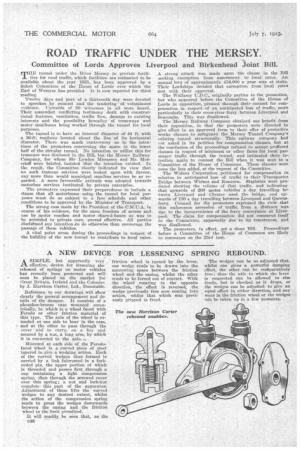ROAD TRAFFIC UNDER THE MERSEY
Page 36

If you've noticed an error in this article please click here to report it so we can fix it.
Committee of Lords Approves Liverpool and Birkenhead Joint Bill.
THE tunnel under the River Mersey to provide faciliJ_ ties for road traffic, which facilities are estimated to be available about the year 1931, has been approved by a Select Committee of the House of Lords over which the Earl of Welnyss has presided. It is now reported for third reading.
Twelve days and part of a thirteenth day were devoted to speeches by counsel and. the tendering of voluminous evidence. -Upwards of 50witnesses in all were heard. Their somewhat conflicting testimony dealt with constructional features, ventilation, traffic flow, damage to existing interests and the possibility hereafter of tramways and motor omnibuses being worked through the tunnel for local purposes.
The tunnel is to haVe an internal diameter of 44 ft. with a 30-ft: roadway located about the line -of its horizontal diameter. There was much controversy as to the intentions of the promoters concerning the space in the lower half of the circular tunnel. No intention to utilize this for tramcars was disclosed in the Bill, but the Mersey Railway Company, for whom Sir Lyn den Macassey and Mr. Monerieff were briefed, insisted that the intention existed. In the result, the Committee clearly indicated its view that no such tramcar services were looked upon with favour, any more than would municipal omnibus services be so regarded. A more favourable attitude was adopted towards motorbus services instituted by private enterprise.
The promoters expressed their preparedness to include a clause that all motorbuses using the tunnel for local purposes must do so subject to a fare schedule and other . conditions to be approved by the Minister of Transport. The strong case made by the President of the C.M.U,A. in course of his evidence, for the same freedom of access and use by motor coaches and motor chars-à-banes as was to be accorded to private ears, proved effective. All parties disclaimed any intention to do otherwise than encourage the passage of these vehicles.
A vital point arose during the proceedings in respect of the liability of the new tunn,e1 to contribute to local rates. A strong attack was made upon the clause in the Bill seeking exemption from assessment to local rates. Aa annual levy of approximately £34,000 a year was at stake. Their Lordships decided that exemption from local rates met with their approval.
The Wallasey U.D.C., originally patties to the promotion, hut who appeared before the Cciromittee of the House of Lords in opposition, pressed through their counsel for compensation in respect •of an anticipated loss of traffic, more particularly to their cross-river ferry between Liverpool and Seacombe, This was disallowed.
The Mersey Railway Company obtained one benefit from their opposition, in that the promoters were directed to give effect in an approved form to their offer of protective works clauses to safeguard the Mersey Tunnel Company's existing tunnel structurally. This railway company had not asked in its petition for compensation clauses, but at the conclusion of the proceedings refused to accept proffered clauses in respect of minimuni or other fares for local passenger traffic -through the tunnel, and intimated their intention again to contest the Bill when it was sent to a Committee of the House of Commons. These clauses were none the less added, at the request of the Committee.
The Widnes Corporation petitioned for compensation in relation to anticipated loss of traffic to their Transporter Bridge between Widnes and Runcorn. Sta,tistics were producecl showing the volume of that traffic, and indicating that upwards of 200 motor vehicles a day travelling between Liverpool and Chester used the bridge, and upwards of 130 a day travelling between Liverpool and Queensferry. Counsel for the promoters expressed the view that this unforeseen accessfon of traffic, from a distance was due to the inconvenience of the ferry conveyance at Liverpool. The claim for compensation did not commend itself to the Committee, apparently due to its remoteness, and was disallowed.
The promoters, in effect, get a clean Bill. Proceedings before a Committee of the House of Commons are likely to commence on the 23rd inst.














































